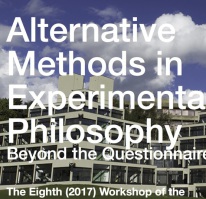A huge "thank-you" to all participants! Our conference was a great success.
We will leave these pages online for a while to serve as a retrospective of the conference. The 2018 conference of the Experimental Philosophy Group UK - our ninth - will be hosted by University College London. We look forward to a capital experience. Just to prove that philosophers are not above the occasional pun.
About the Conference
Taking place on the iconic campus of the University of East Anglia, Norwich, UK on the weekend of the 15th and 16th of July 2017, this will be the eighth annual conference of the Experimental Philosophy Group UK, presented with the support of the Mind Association and the Analysis Trust. The major theme for this year will be "Alternative Methods in Experimental Philosophy - Beyond the Questionnaire". When the new discipline of experimental philosophy began to become established in the early 2000s, a widely used method involved the creation of a scenario in the form of a thought experiment; participants were then asked for their intuitive responses to variations on that scenario. The most famous result of this was the discovery of the Knobe Effect. Today, as the discipline matures, experimental philosophers are employing a variety of techniques drawn from psychology, psycholinguistics, computational neuroscience and the digital humanities (as well as many others) to explore empirically, age-old philosophical issues. Our conference, this July, will celebrate these approaches and some that we are yet to hear of!
The main purpose of the conference is to catalyse these developments by offering experimental philosophers from around the world the opportunity to familarise themselves with a variety of alternative methodologies, to explore fresh philosophical applications for these methods and to facilitate networking and the development of new, innovative collaborations.
We have invited keynote speakers whose work will be of interest to most experimental phlosophers. X-phi pioneer Shaun Nichols (Arizona) will open the conference. Arianna Betti (Amsterdam) will present intriguing new developments in the field of digital humanities. Closing the conference, UEA philosopher Eugen Fischer and psychologist Paul Engelhardt will present results from their latest interdisciplinary collaboration.
More details on the keynote speakers page.
As well as the three plenary sessions, we anticipate around eighteen breakout sessions in two simultaneous streams. While around half of these will be reserved for research directly relating to the theme, the remaining sessions will be open to papers presenting work from all areas of experimental philosophy and the wider applied philosophy ramifications of this research. There will also be a poster presentation session, to which we invite all experimental philosophers with no thematic restrictions.
We plan to publish selected contributions to the conference in the edited collection "Methodological Advances in Experimental Philosophy", part of the series "Advances in Experimental Philosophy" published by Bloomsbury (series editor: James Beebe, Buffalo). See: http://www.bloomsbury.com/uk/series/advances-in-experimental-philosophy/.
Thanks to a grant from the Analysis Trust we will be able to offer small bursaries to assist a number of postgraduate research students with the costs of attending the conference. Full details and how to apply will be included with the registration form.
Delegates to the conference will be able to register here once registration opens.
Experimental Philosophy Group UK
Experimental philosophy is a fast-growing interdisciplinary movement that adapts empirical methods from the social sciences - especially (but not limited to) psychology - to new uses within philosophy.
The UK group has been at the forefront of the development of the discipline of experimental philosophy on this side of the Atlantic. Its annual conferences have become the UK's main forum to report and discuss fresh work in any area of experimental philosophy. Speakers and delegates from the UK, Europe, North America and as far afield as Japan and South Africa have attended to take advantage of this unique forum.
Additionally, the conferences have been instrumental in developing the early careers of a number of PhD researchers in experimental philosophers both by widening their horizons and offering the opportunity to develop collaborations.
Download this map of the University of East Anglia Campus to find the Julian Study Centre - venue for the conference and Broadview Lodge - the on-campus hotel (both highlighted).
X-Phi Conference Campus Map.pdf
Adobe Acrobat document [8.6 MB]







